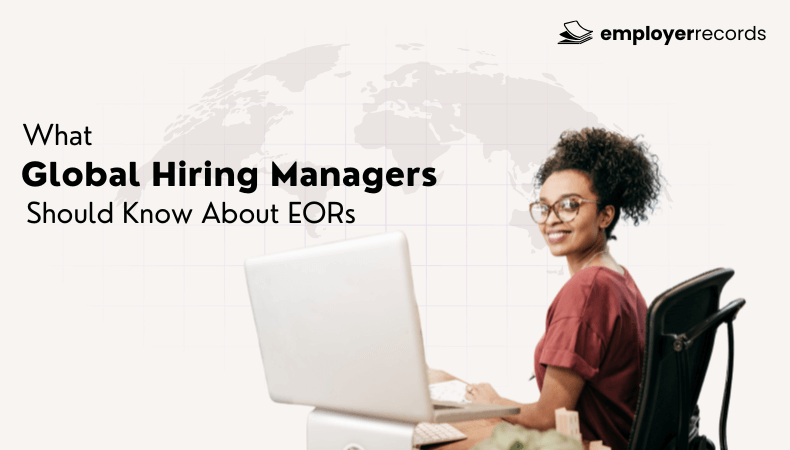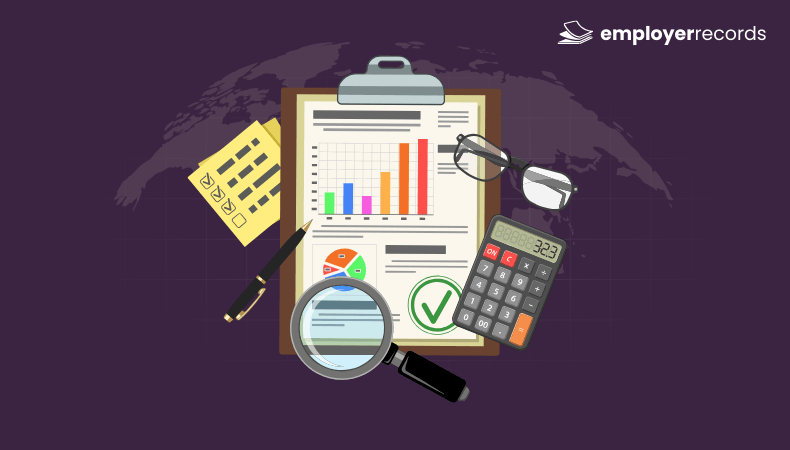Audit readiness might not be the most exciting part of running a business, but it’s one you can’t afford to ignore, especially if you’re hiring across different countries. Between shifting local laws, tax rules, and growing regulatory pressure, even small mistakes in payroll or worker classification can lead to serious problems.
That’s where an Employer of Record (EOR) comes in. By acting as the legal employer on your behalf, an EOR takes care of payroll, taxes, benefits, and compliance with local labor laws, so your team doesn’t have to figure it all out from scratch. It’s a practical way to reduce risk, stay compliant, and be prepared when an audit happens.
In this guide, we’ll walk through how EORs help businesses stay audit-ready without burning time or resources on manual compliance work.
What Is An Employer Of Record (EOR)?
An Employer of Record (EOR) is a third-party organization that legally employs workers on behalf of another company. At the same time, the client retains control over the day-to-day tasks.
The EOR assumes full responsibility for payroll processing, tax withholding and remittance, benefits administration, and compliance with local labor laws.
By acting as the official employer, the EOR shields the client from misclassification risks and ensures adherence to jurisdiction-specific regulations. This model enables companies to hire globally without establishing a local legal entity, simplifying international expansion and reducing operational burden.
Ultimately, partnering with an EOR streamlines HR administration and keeps businesses audit-ready across multiple regions.
Selecting The Right EOR Partner
Choosing the right EOR starts with finding a provider who meets your current needs and can also handle future audit challenges.
Start by checking each provider against key criteria to make sure they can fully support your compliance and audit-readiness goals.
- Proven track record in your target jurisdictions: Confirm the EOR’s experience and client success stories in the specific countries where you operate, demonstrating deep local expertise and regulatory understanding.
- Dedicated audit-support services and SLA commitments: Look for formal Service Level Agreements that guarantee timely audit assistance, defined response times, and clear escalation paths to resolve issues efficiently.
- Technology capabilities (document management, reporting): Assess the provider’s platform for centralized, secure document repositories, real-time compliance dashboards, and automated reporting tools that streamline data retrieval and analysis.
Additionally, verify scalability by ensuring the EOR can rapidly extend services to new regions without delays or reliance on third-party networks.
Check client testimonials and case studies for insights into responsiveness and issue resolution. Finally, confirm integration options with your existing HRIS and accounting systems to maintain seamless data flows and reinforce audit trails.
Learn how to select the right EOR solution for your business here.
The Importance Of Being Audit-Ready
Staying audit-ready means being prepared for a thorough review by tax authorities, regulators, or third-party auditors at any given time.
Audits can be triggered by various factors, such as discrepancies in financial records, employee misclassification, or failure to comply with tax regulations. If your company is not prepared, an audit can lead to penalties, fines, or even legal action.
In an increasingly globalized workforce, staying compliant with local labor laws, tax regulations, and employment practices can be particularly daunting. This is where EORs play a vital role in ensuring your operations are always up to standard.
Pre-Audit Gap Analysis And Remediation (Scoping Requirements)
Begin by defining the scope of your analysis, specifying which local labor laws, tax regulations, and business processes will be assessed. Next, map each regulatory requirement to its corresponding HR and payroll processes to pinpoint where controls must be applied.
Engage cross-functional stakeholders, legal, finance, HR, and operations, to ensure all obligations and practical workflows are captured. Establish clear objectives and key performance indicators (KPIs) to measure compliance gaps against desired audit outcomes.
Employ Business Process Management (BPM) methodologies to model current processes, visualize data flows, and identify inefficiencies. Benchmark existing controls against industry standards or frameworks, such as SOC 2 or ISO 9001, to evaluate their adequacy.
Pay special attention to differences between local labor law requirements and tax obligations to avoid dual-compliance pitfalls. Document all process workflows, policies, and contract templates to create a comprehensive inventory of current state artifacts.
Leverage compliance and audit-management tools that provide immutable audit trails and real-time monitoring dashboards. Finally, categorize identified gaps by severity and likelihood to prioritize remediation tasks effectively.
Key Audit-Readiness Metrics & KPIs
Effective audit readiness hinges on tracking quantitative measures that reveal the health of your employment and payroll compliance programs.
By monitoring these KPIs, you can detect emerging gaps, prioritize remediation, and demonstrate continual improvement to auditors and regulators.
- Contract completeness rate – The percentage of employee files with fully executed, locally compliant contracts reflects your ability to maintain accurate legal records and avoid contract-related penalties.
- Payroll error rate – Measured as the number of payroll corrections per 1,000 payslips issued, this metric highlights the accuracy of tax withholdings and deductions, helping you minimize audit findings and fines.
- Time-to-retrieve records – The average time required to gather and present requested audit documents indicates the efficiency of your record-keeping system; shorter retrieval times reduce audit disruptions and demonstrate control maturity.
Together, these metrics form a proactive scorecard for compliance health, enabling regular benchmarking, trend analysis, and targeted process improvements in partnership with your EOR provider.
How EORs Help You Stay Audit-Ready
Now that we’ve outlined how to measure audit-readiness, let’s explore how an EOR actively contributes to meeting those benchmarks.
As your legal employer, the EOR takes responsibility for ongoing admin tasks like payroll, taxes, and HR compliance, so your internal team doesn’t have to.
By managing contracts, regulatory filings, and record-keeping, EORs ensure seamless global hiring without entity setup.
How an Employer of Record (EOR) Strengthens Audit Readiness, End-to-End Impact
| Compliance Area | Challenges Without EOR | How EOR Solves It | Quantifiable Impact |
|---|---|---|---|
| Payroll Accuracy | Manual errors, late filings, misclassified income | Automated payroll processing, local tax compliance, timely filings | ↓ Payroll error rate per 1,000 payslips ↓ Risk of fines |
| Employee Classification | Misclassifying workers (e.g., contractors vs. employees) | Aligns roles with local labor laws; ensures contracts match local definitions | ↓ Misclassification audit triggers |
| Contract Compliance | Missing, incomplete, or non-localized contracts | Issues fully compliant, locally vetted contracts | ↑ Contract completeness rate (tracked as a key KPI) |
| Benefits Administration | Inconsistent benefit offerings across regions | Manages legally required and competitive benefits across jurisdictions | ↑ Employee satisfaction & retention ↓ Regulatory violations |
| Document Management | Scattered files, slow response to audit requests | Centralized, secure record-keeping with fast retrieval | ↓ Time-to-retrieve audit records |
| Audit Support | Reactive response, high stress during audits | Dedicated audit assistance, documentation support, liaison with authorities | ↓ Audit resolution time ↓ Internal resource strain |
| Scalability & Market Entry | Legal entity setup delays, compliance gaps in new markets | Enables hiring without an entity, with instant compliance in new countries | ↑ Speed to hire (up to 80%) ↓ Setup overhead |
| Overall Risk Reduction | High exposure to penalties and reputational damage | Proactive compliance monitoring and reporting across all functions | ↓ Legal risk ↑ Operational confidence |
| Cost & Efficiency | High internal HR/legal costs to maintain compliance manually | Frees up teams for strategic work, reduces need for external legal/compliance consultants | ↑ 250+ hours/year saved (Bonadio Group) ↑ Cost savings on penalties |
Compliance With Local Labor Laws
Because your EOR operates locally in each market, they handle the ins and outs of regional laws, helping you avoid compliance slip-ups.
They ensure that your contracts, working hours, benefits, and other employment-related matters meet the legal requirements of each jurisdiction, keeping you audit-ready at all times.
By taking on the responsibility of compliance, an EOR ensures that your business follows all regional rules and avoids costly violations. This removes the complexity of managing multiple compliance requirements in different locations.
Accurate Payroll Management
Payroll is often one of the most scrutinized areas during an audit. Misclassifying employees or failing to withhold the correct amount of taxes can lead to significant penalties.
Your EOR already oversees payroll accuracy and tax filings, which are often the first areas auditors focus on.
EORs also keep detailed records of all payroll transactions, making it easy to provide the necessary documentation in case of an audit. These records are well-organized and compliant with local tax laws, so you can quickly present them when required.
Benefits Administration And Tax Filings
EORs take care of managing employee benefits and tax filings, both of which are key components of an audit.
By partnering with an EOR, you ensure that your employees receive the benefits they are entitled to and that all tax filings are completed accurately and on time.
For example, if your company operates in multiple countries, each region may have different benefits requirements, such as healthcare, retirement plans, or paid leave.
An EOR handles these complexities and ensures that you are fully compliant with all legal obligations.
Employee Classification And Contract Management
Misclassification of workers, such as treating an employee as an independent contractor, can be a red flag during an audit. Your EOR partner helps you classify workers correctly from the start.
Whether you have full-time employees, contractors, or part-time workers, an EOR will ensure that each one is categorized appropriately.
Additionally, EORs handle the preparation and management of employment contracts, ensuring that they are legally compliant and cover all the necessary terms and conditions. Properly drafted contracts protect both the employer and the employee, reducing the risk of disputes during audits.
Audit Support And Documentation
When an audit is triggered, having a reliable record-keeping system and comprehensive documentation is essential. With centralized record-keeping already handled by your EOR, you’re in a better position to respond quickly when auditors request documentation.
In the event of an audit, these records can be quickly retrieved and presented to auditors.EORs also assist in navigating the audit process, providing support and guidance to ensure a smooth experience.
They act as an intermediary between your business and the auditors, helping to resolve any issues and ensuring that your business remains in compliance.
To better understand how EORs improve audit readiness compared to traditional in-house methods, here’s a side-by-side comparison:
| Function | In-House Team | EOR Partner |
|---|---|---|
| Payroll Errors | High risk of manual mistakes | Automated, compliant payroll |
| Contract Compliance | Varies across markets | Standardized, locally vetted |
| Audit Support | Time-consuming, reactive | On-demand, proactive |
| Record Retrieval | Scattered, manual | Centralized, instant |
Cost-Benefit Analysis Of EOR-Driven Audit Support
A structured cost-benefit analysis of EOR-driven audit support quantifies financial impact, ROI, and operational efficiencies, empowering stakeholders to make informed decisions (e.g., reallocating budgets toward growth rather than compliance overhead).
By translating audit-readiness activities into monetary and time-based metrics, businesses can demonstrate the value of partnering with an EOR to executive leadership and justify ongoing investment in outsourced compliance solutions.
- Savings on fines/penalties avoided (BPM): Leveraging expert EOR compliance reduces non-compliance incidents, cutting potential fines and legal penalties by up to 30% annually.
- Internal resource hours freed from compliance tasks (The Bonadio Group): Automating and outsourcing payroll and audit prep saves teams an average of 250+ work hours per year, boosting productivity and focus on strategic projects.
- Faster time-to-hire in new markets, reducing project delays (AuditBoard): EOR services accelerate market entry by up to 80%, slashing hiring timelines and preventing costly project bottlenecks.
Key Benefits Of Partnering With An EOR To Stay Audit-Ready
Partnering with an EOR delivers tangible advantages, such as streamlined HR processes, simplified payroll, and minimized legal risks, that fortify your audit-readiness posture.
By offloading complex compliance tasks, businesses can proactively maintain accurate records, avoid fines, and focus on strategic growth initiatives.
- Reduced Risk of Penalties: By ensuring compliance with local regulations and proper payroll management, EORs help reduce the risk of fines or penalties during an audit.
- Peace of Mind: With the EOR handling compliance, payroll, and benefits, you can focus on growing your business without worrying about audit-related issues.
- Expertise in Global Compliance: EORs are well-versed in international labor laws, ensuring that your company remains compliant in all markets where you operate.
- Efficient Audit Process: With detailed documentation and accurate records, EORs streamline the audit process and reduce the time and resources required to manage an audit.
Conclusion
Staying audit-ready might feel like a moving target, especially when you’re managing teams across different countries with constantly changing rules. But it doesn’t have to be overwhelming.
A trusted EOR partner helps take the guesswork out of compliance by handling everything from payroll and contracts to tax filings and documentation, giving you peace of mind that your business is in good standing no matter where you hire.
More than just checking boxes, audit-readiness with an EOR means fewer surprises, smoother audits, and more time for your team to focus on growth, not paperwork.







